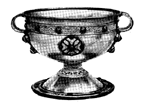
When Fachtna Finn
(who was Chief Poet of Ulster away before the Christian Era) learned that the
Ulster chiefs plotted to slay at a feast their two kings, Congal Clairnach and
Fergus MacLeide, he saved both their lives by seating each between poets. The
assassins then had to stay their murderous hands lest the poets should be
accidentally slain or injured. In the very rare instances in which such
disaster befell the land, the whole nation mourned the calamity, and the
sacrilegious scoundrel, who had been guilty of the appalling crime, was shunned
by man, cursed by God and punished, moreover, with immortal obloquy.
When Cuain O'Lochain, chief poet of Erin, was, in
1024, put to death by the people of Teffia, the Annals of Clonmacnois
records--"after committing of which there grew an evil scent and odour off
the party that killed him, that he was easily known among the rest of the
land." And the Annals of Loch Cé, continuing the after history of
the sacrilegious ones who had hand in the poet's death, says: "God
manifestly wrought a poet's power upon the parties who killed him, for they
were put to a cruel death, and their bodies putrefied, until worms and vultures
had devoured them.
The Story of the Irish Race, by Seumas MacManus
(The Devin-Adair Company: New York, 1944/1967) page 176.